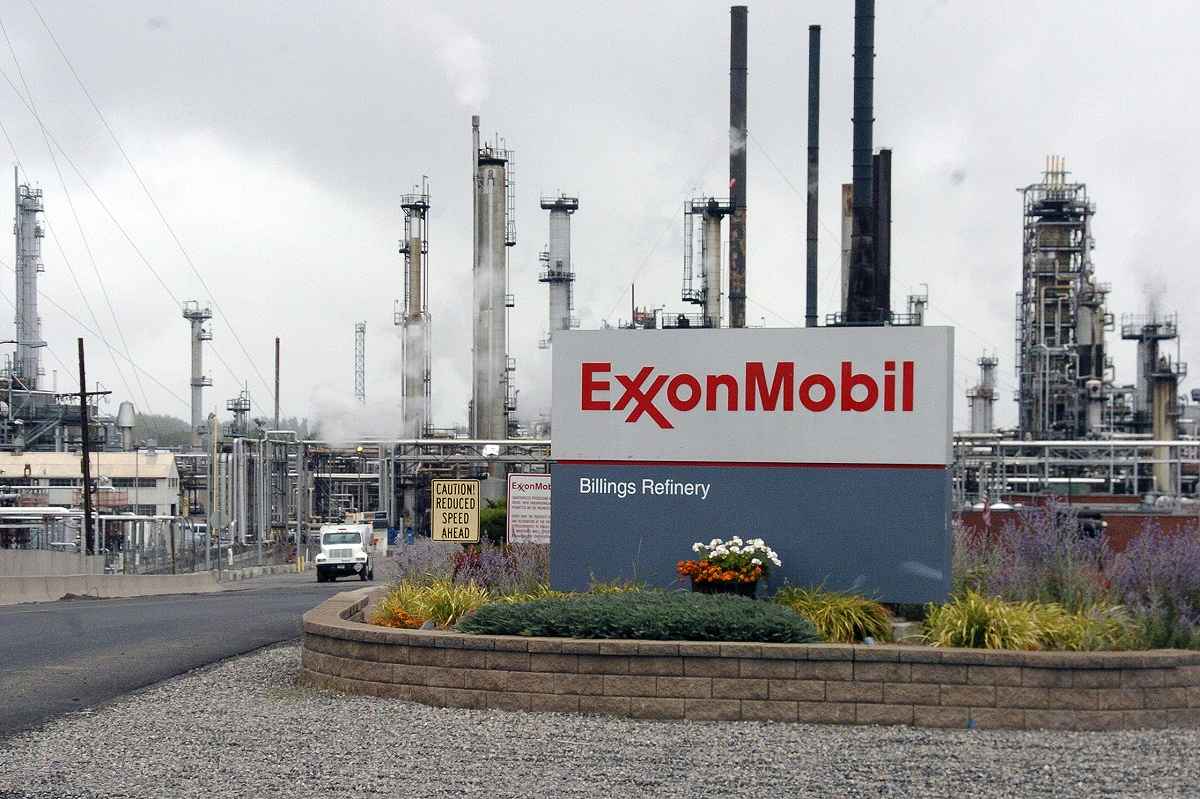
The Exxon Mobil Billings Refinery is seen in Billings, Mont.
14:12 JST, January 18, 2023
DENVER (AP) — Exxon Mobil’s scientists were remarkably accurate in their predictions about global warming, even as the company made public statements that contradicted its own scientists’ conclusions, a new study says.
The study in the journal Science Jan. 12 looked at research that Exxon funded that didn’t just confirm what climate scientists were saying, but used more than a dozen different computer models that forecast the coming warming with precision equal to or better than government and academic scientists.
This was during the same time that the oil giant publicly doubted that warming was real and dismissed the accuracy of climate models. Exxon said its understanding of climate change evolved over the years and that critics are misunderstanding its earlier research.
Scientists, governments, activists and news sites, including Inside Climate News and the Los Angeles Times, several years ago reported that “Exxon knew” about the science of climate change since around 1977 all the while publicly casting doubt. What the new study does is detail how accurate Exxon funded research was. Sixty three percent to 83% of those projections fit strict standards for accuracy and generally predicted correctly that the globe would warm about 0.2 C a decade.
The Exxon-funded science was “actually astonishing” in its precision and accuracy, said study coauthor Naomi Oreskes, a Harvard science history professor. But she added so was the “hypocrisy because so much of the Exxon Mobil disinformation for so many years … was the claim that climate models weren’t reliable.”
Study lead author Geoffrey Supran, who started the work at Harvard and now is an environmental science professor at the University of Miami, said this is different than what was previously found in documents about the oil company.
“We’ve dug into not just the language and the rhetoric in these documents, but also the data. And I’d say in that sense, our analysis really seals the deal on ‘Exxon knew,’” Supran said. It “gives us airtight evidence that Exxon Mobil accurately predicted global warming years before, then turned around and attacked the science underlying it.”
The paper quoted then Exxon CEO Lee Raymond in 1999 as saying future climate “projections are based on completely unproven climate models, or more often, sheer speculation,” while his successor in 2013 called models “not competent.”
Exxon’s understanding of climate science developed along with the broader scientific community, and its four decades of research in climate science resulted in more than 150 papers, including 50 peer-reviewed publications, said company spokesman Todd Spitler.
“This issue has come up several times in recent years and, in each case, our answer is the same: those who talk about how ‘Exxon Knew’ are wrong in their conclusions,” Spitler said in an emailed statement. “Some have sought to misrepresent facts and Exxon Mobil’s position on climate science, and its support for effective policy solutions, by recasting well intended, internal policy debates as an attempted company disinformation campaign.”
Exxon, one of the world’s largest oil and gas companies, has been the target of numerous lawsuits that claim the company knew about the damage its oil and gas would cause to the climate, but misled the public by sowing doubt about climate change. In the latest such lawsuit, New Jersey accused five oil and gas companies including Exxon of deceiving the public for decades while knowing about the harmful toll fossil fuels take on the climate.
Similar lawsuits from New York to California have claimed that Exxon and other oil and gas companies launched public relations campaigns to stir doubts about climate change. In one, then Massachusetts Attorney General Maura Healey said Exxon’s public relations efforts were “reminiscent of the tobacco industry’s long denial campaign about the dangerous effects of cigarettes.”
Oreskes acknowledged in the study that she has been a paid consultant in the past for a law firm suing Exxon, while Supran has gotten a grant from the Rockefeller Family Foundation, which has also helped fund groups that were suing Exxon. The Associated Press receives some foundation support from Rockefeller and maintains full control of editorial content.
Oil giants including Exxon and Shell were accused in congressional hearings in 2021 of spreading misinformation about climate, but executives from the companies denied the accusations.
Top Articles in Science & Nature
-

Japan Institute to Use Domestic Commercial Optical Lattice Clock to Set Japan Standard Time
-

Japan to Face Shortfall of 3.39 Million Workers in AI, Robotics in 2040; Clerical Workers Seen to Be in Surplus
-

Record 700 Startups to Gather at SusHi Tech Tokyo in April; Event Will Center on Themes Like Artificial Intelligence and Robotics
-

iPS Treatments Pass Key Milestone, but Broader Applications Far from Guaranteed
-

iPS Cell Products for Parkinson’s, Heart Disease OK’d for Commercialization by Japan Health Ministry Panel
JN ACCESS RANKING
-

Japan PM Takaichi’s Cabinet Resigns en Masse
-

Japan Institute to Use Domestic Commercial Optical Lattice Clock to Set Japan Standard Time
-

Israeli Ambassador to Japan Speaks about Japan’s Role in the Reconstruction of Gaza
-

Man Infected with Measles Reportedly Dined at Restaurant in Tokyo Station
-

Videos Plagiarized, Reposted with False Subtitles Claiming ‘Ryukyu Belongs to China’; Anti-China False Information Also Posted in Japan






















